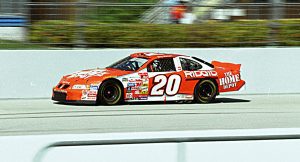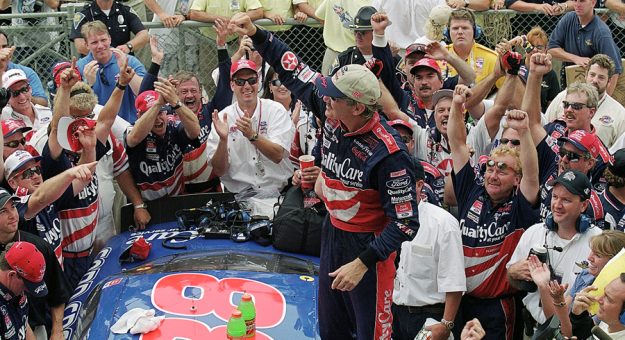Editor’s Note: NASCAR is celebrating its 75th anniversary. SPEED SPORT was founded in 1934 and was already on its way to becoming America’s Motorsports Authority when NASCAR was formed. As a result, we will bring you Part 52 of a 75-part series on the history of NASCAR as told in the pages of National Speed Sport News and SPEED SPORT Magazine.
Dale Jarrett didn’t win the most races and didn’t lead the most laps. What he did do was win his first NASCAR Winston Cup championship in impressive fashion.
Jarrett drove Robert Yates’ Ford to the title by 201 points over Bobby Labonte to become along with his father, Ned, the only second father-and-son duo (Lee and Richard Petty) to win NASCAR’s most prestigious crown.
Winning four times during the 34-race season, Jarrett’s Todd-Parrott led Ford Quality Care team was consistent throughout the year.
“We were able to basically go through a season and not have any problems other than the two accidents I got myself in at Daytona and Bristol,” Jarrett said. “Other than that, we pretty much had a smooth road as far as having no mechanical failures or anything like that.
“That’s just a tremendous accomplishment on our guy’s part-preparing a car for 34 weeks and not having any failures like that. That’s what makes me proud, that we realized what we were able to do and then we were able to go out and execute that plan.”
While Jarrett was not always near the front during the long Winston Cup races, he was usually in the top five when the race ended. Parrott and Jarrett clearly clicked as their car repeatedly improved as races wore on. Their abilities to adjust their car led to an unforgettable year.
The 42-year-old North Carolina driver finished in the top five 24 times and accumulated 29 top-10 efforts in 34 events.
Jarrett didn’t win his first race until June when he claimed victory at Richmond (Va.) Raceway. The Yates team added victories at Michigan, Daytona and Indianapolis. The team never tasted victory again after winning the Brickyard 400 Aug. 6.
However, the team only failed to finish one race the entire year.
“I think 1999 was kind of a culmination of 1996, ’97 and ’98,” Jarrett said. “You have good leadership with people like Todd Parrott and Robert Yates. Looking at what hurt us in the past. We sat down at the end of 1998 and decided on the people we needed in each position and what it was going to take to try to win a championship.
“That’s what we were after, it wasn’t about just winning races.
“I don’t know that we went about things in a different way, in fact, I know we didn’t, we just paid attention to detail,” Jarrett said. “Our people were more experienced in working together and the people we were fortunate enough to bring in and add fit right into the mix and all of that worked in our favor.”
Naturally, Jarrett, a family man, was especially proud to become a second-generation champion.
“Not many people get to go to work and have their family there supporting them,” Jarrett said. “I have someone in my immediate family there pretty much every weekend whether it’s my wife Kelley and our kids, or my mom or my dad. My sister Patti (Makar) is there at times, Glenn is there, my brother, so I have someone there all the time.
“I also have my next family who are Todd and Robert and the race team, so I’m pretty fortunate in that I have that type of support. Not many people get that kind of support in their jobs.”
Labonte, meanwhile enjoyed the best year of his career, driving Joe Gibbs’ Interstate Batteries Pontiac to five victories and second in the points. Labonte amassed 23 top-five finishes and 26 top 10s. Ultimately, dropping out of a handful of races kept Labonte from pushing Jarrett for the crown.
Labonte proved his team, led by Jarrett’s brother in-law Jimmy Makar, is ready to contend for a championship.
“This year we got a lot closer than we’ve ever been,” Labonte said. “We learned patience. We learned about fast pit stops, fast race cars. I think that helped us out. When you run up front like we did this year it seems like you do learn a lot.”
If he learns a little more, Labonte could join his brother Terry as the only brothers to each win the coveted Winston Cup championship.
Mark Martin finished third, but was never in serious title contention. Despite racing through the middle of the season with a series of painful injuries, Martin managed to drive his Valvoline Ford to a pair of victories, 19 top-five finishes and 26 top-10 efforts.

Tony Stewart may have carried a yellow rookie stripe on the back of Joe Gibbs’ Pontiac, but the 1997 Indy Racing League champion rarely drove like a rookie. Stewart quickly got the attention of fans and competitors.
The open-wheel graduate drove to three victories, including two straight at season’s end. Stewart’s triumphs in consecutive weeks at Phoenix Raceway and Homestead-Miami Speedway, combined with Labonte’s victory in the finale at Atlanta Motor Speedway, gave Joe Gibbs Racing a sweep of the final three events.
In its first season as a two-car operation, the Gibbs team won eight races. In addition to the three victories, Stewart’s run to rookie-of-the-year honors included a pair of poles, 12 top-five finishes and 21 top 10s.
While Gordon led the series with seven victories, fifth-place points runner Jeff Burton drove his Roush Racing Exide Batteries Ford to six triumphs, including a pair of $1 million No Bull Five victories.
With Frank Stoddard calling the shots, Burton amassed 18 top fives and 23 top 10s.
Failing to finish more races than the competition proved to be Burton’s downfall.
After three Winston Cup championships In 4 years, Gordon’s sixth-place points effort had to be a bit or a letdown. However, the DuPont Chevrolet team still led the series in victories (seven) and poles (seven) despite losing crew chief Ray Evernham during the final third of the season as he left the team to head up Dodge’s return to Cup Series racing in 2001.
With 18 top fives and 21 top 10s, Gordon was the best finishing Chevrolet driver in the standings.
With Brian Whitesell in place as crew chief, Gordon’s Hendrick Motorsports team will have the challenge of bouncing back from a disappointing year as it replaces five crew members who left the team at the end of the year.
Seven-time Cup Series champion Dale Earnhardt and his Richard Childress racing team enjoyed their best season in several years. Earnhardt won twice at Talladega (Ala.) Superspeedway, and in controversial style at Bristol (Tenn.) Motor Speedway, punting Terry Labonte out of the lead on the final lap.
Earnhardt posted 21 top-10 his sponsorship and was forced efforts in the GM Goodwrench Chevrolet to finish seventh in the points.
By his own standards of winning races, Rusty Wallace fell short of the norm as he posted a single victory and finished eighth in the standings. Despite finishing second on several occasions, Ward Burton was winless in the Bill Davis Racing Pontiac. Still, Burton enjoyed his best season, cracking the top 10 for the first time in his career, finishing ninth with 16 top-10 efforts.
Although, he also failed to win a race, Earnhardt’s RCR teammate, Mike Skinner, secured his first top-10 points finish in the Lowe’s Chevrolet.
While eight of the top 10 drivers won races, only three outside the top 10 visited victory lane. Terry Labonte finished 11th and posted a single victory, while John Andretti drove Richard Petty’s Pontiac to victory at Martinsville in April.
Finally, Joe Nemechek posted the first victory of his career, winning the September event at New Hampshire Motor Speedway driving for Felix Sabates.
Conspicuous in his absence from the winner’s list was Ricky Rudd, whose 17-year winning streak ended in a dismal year in which Rudd lost his sponsorship and was forced to close his Rudd Performance Motorsports team.
On the strength of Jarrett’s driver’s performance, Ford won the manufacturer’s crown for the first time since 1992. The season also saw the retirement of Ernie Irvan, who called it a career after a major crash at Michigan Speedway in August.
